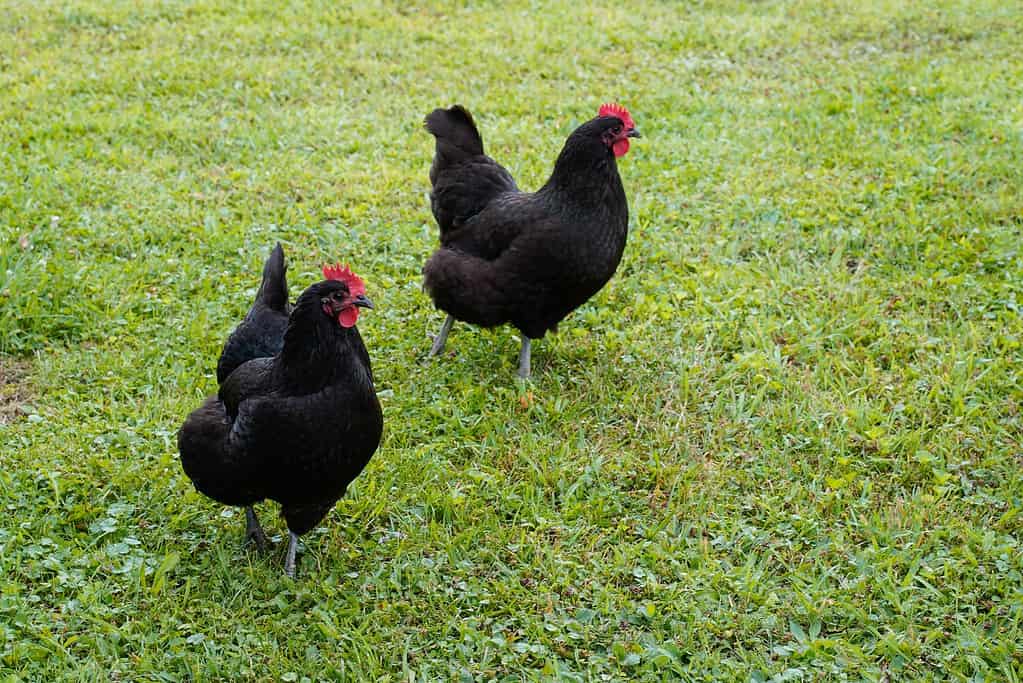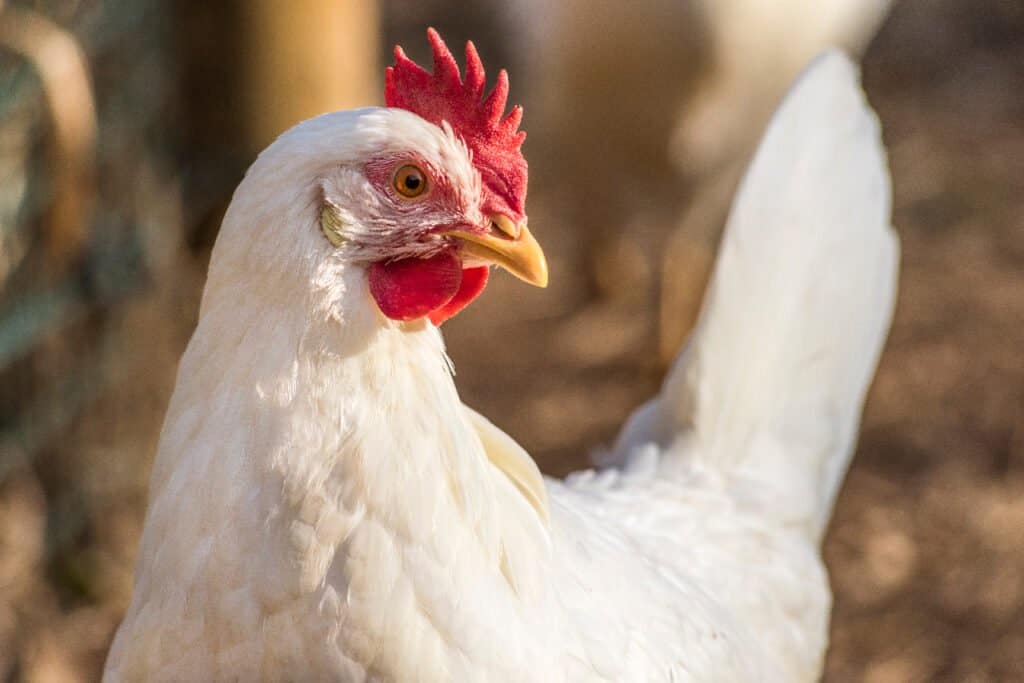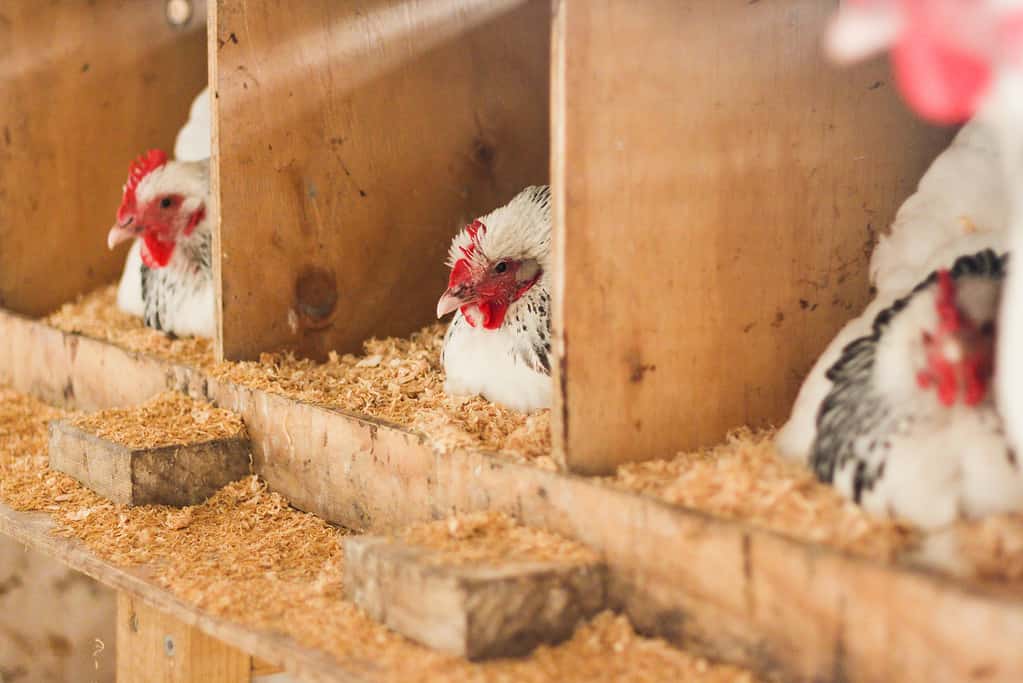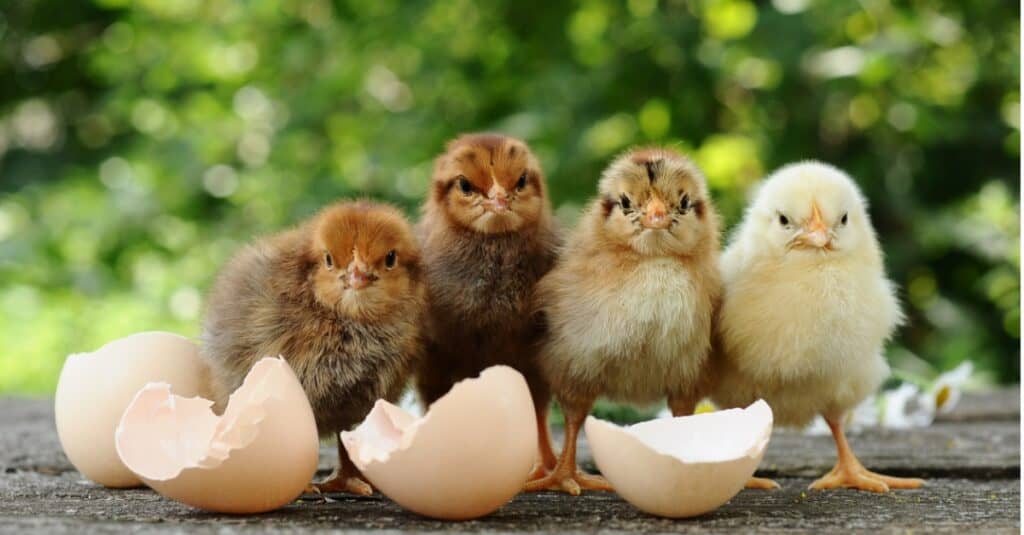Raising and caring for chickens can be incredibly rewarding, and many chicken owners look forward to their flock’s first eggs! But how long does it take for a hen to lay an egg? At what age should your chickens lay their first eggs, and how do you know when to expect it? Read on as we explore the entire egg-laying process, how long the whole ordeal takes, and what you should expect.
How Long Does it Take a Chicken Lay its First Egg?

The Australorp chicken breed is known for being especially productive when it comes to laying eggs. Most Australorp hens begin laying eggs when they are around 6 to 7 months old.
©Kathy D. Reasor/Shutterstock.com
The exact age a hen will lay her first egg can vary depending on her breed, diet, and environment. However, most pullets begin laying at an age of around 18 to 22 weeks, or roughly four to six months old. A hen that is under one year old is often referred to as a pullet, though both terms are often used interchangeably for young female chickens.
Some of the best egg-laying chicken breeds like the Leghorn and Australorp varieties can begin laying eggs as early as four months old. Meanwhile, varieties that have been bred for show or their meat, such as the Brahma or the Silkie, tend to begin laying a bit later at anywhere from six to seven months old, with some starting to lay eggs as late as nine to eleven months of age.
How Often Do Chickens Lay Eggs?

Leghorn hens are excellent egg-layers and can produce over 300 eggs per year in their prime.
©Jay-Dee/Shutterstock.com
On average, a hen will lay anywhere from 150 to 300 eggs per year, or around one egg every one to three days. Exactly how often a hen will lay eggs also varies depending on her breed, diet, age, overall health, and environment. Notably, younger pullets tend to lay more sporadically. Their first few dozen or so eggs will likely be smaller or oddly shaped compared to those of a slightly older hen, though they are still safe to eat.
As they age, however, the overall frequency at which hens lay eggs gradually goes up, with most laying one egg every other day or so. Chickens are in their prime egg-laying years from around 8 months to 3 years of age. During this time, it is common for especially healthy egg-laying breeds to produce almost one egg per day.
After around three years of age, a hen’s egg productivity starts to gradually decrease again. Most backyard flocks can live anywhere from four to ten years, and many hens continue laying well into their older years. At this point, though, egg production can decrease to as low as one or two eggs per week.
How Do You Know When a Chicken is About to Lay an Egg?

Providing your hens with suitable nesting boxes as pictured will help ensure they lay their eggs in the same spot each time. This will make it easier for you to track and collect them.
©iStock.com/nedjelly
There are several behaviors to keep an eye out for that can indicate your hen is preparing to lay an egg. Many hens who are about to lay will linger near their nesting boxes, become more vocal and restless, and potentially even chase other hens away from their nesting spot. As they are diurnal animals, chickens most commonly lay eggs during the early morning to afternoon hours of the day.
Another behavior common in hens preparing to lay is frequent squatting, particularly when you approach them. This is a submissive behavior that signals to a rooster a hen is ready to mate.
Additionally, your hen’s body and overall appearance will change as she matures. Her comb and wattles will become larger and redder soon before she begins laying. Her body will also become rounder and heavier as her slender pullet body gradually fills out. This will likely coincide with a sudden increase in her appetite, which is to both support her growing body as well as her eggs.
It’s also a good idea to keep track of your flock’s approximate ages. This can also help you know when to expect their first eggs, as well as when their productivity will begin to decline at around 3 years old.
How Long Does it Take a Fertilized Chicken Egg to Hatch?

You can expect a fertilized chicken egg to take around 21 days to hatch.
©iStock.com/OlgaVolodina
If you’re planning on hatching your hens’ eggs rather than eating them, the first thing you probably want to know is how long it takes them to hatch! Assuming you have at least one rooster in your flock who is mating with your hens, you’re likely to end up with a few fertilized eggs–as well as some broody behavior from your hens–at some point.
If you want to discern your hens’ fertilized eggs from the non-fertile ones, you’ll be able to do so around four to seven days after they’ve been laid. This method, known as “candling,” involves simply holding a light behind the egg and looking for a developing embryo.
To do this, gently pick up the egg, avoiding turning or jostling it. Next, hold a flashlight or other bright light source just behind it. If you see a small reddish spot with lots of veiny lines coming out of it, congratulations–the egg is fertile!
On average, it takes about 21 days for a fertilized chicken egg to hatch. You can either allow your hens to lay on their eggs themselves and hope for the best or utilize an incubator and hatch them yourself. Incubators are generally more reliable if you’re hoping to produce as many chicks as possible. However, hens are less expensive and require less maintenance overall when it comes to hatching fertilized eggs.
The photo featured at the top of this post is © Kathy D. Reasor/Shutterstock.com
Thank you for reading! Have some feedback for us? Contact the AZ Animals editorial team.






